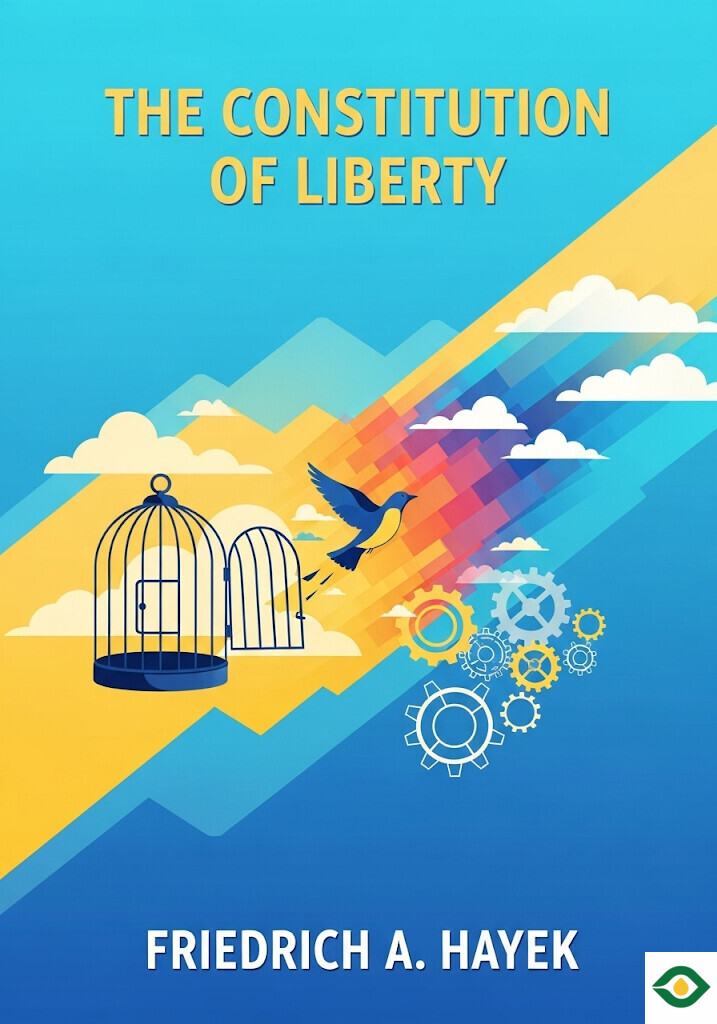Description
Freedom is one of humanity’s oldest and most powerful ideas. From ancient Greece to the Enlightenment, thinkers have argued that human progress comes when people are free to choose their own path. Friedrich A. Hayek’s The Constitution of Liberty is a defense of this principle. He believed that too much government control—whether through socialism, planning, or excessive welfare—endangers freedom itself. His book is not just about politics; it is about the conditions that make a truly free society possible.
Hayek begins with a basic idea: liberty means that people are not controlled by others. It is the freedom to make decisions for yourself without outside coercion. Of course, this does not mean we can do absolutely anything we want. Our natural abilities, resources, and circumstances will always set limits. But those limits are very different from being forced or restricted by another person or the state. Coercion removes choices, while liberty multiplies them. For Hayek, preserving liberty—even as an imperfect ideal—should be the core task of any society.
But liberty does not exist alone. It interacts with other values like equality and democracy, which are often confused with freedom but are not the same. Equality before the law—meaning everyone is treated the same in legal matters—is essential. However, economic equality is different. In a free society, some people will naturally earn more than others, depending on what value they create. For example, an inventor whose creation changes the world might earn far more than a teacher or a farmer. That inequality may look unfair, but Hayek argues it is not a violation of liberty. Trying to enforce economic equality by redistributing wealth means restricting people’s choices, which undermines freedom itself.
Democracy, too, is often assumed to be the same as liberty. But democracy is just a system for choosing leaders. A democratic government can still pass laws that limit freedom, and even popular votes can strip away rights. History shows that democracies sometimes choose authoritarian policies. Hayek insists that democracy works best when it is guided by strong principles—chief among them, individual liberty.
A key reason liberty matters so much, Hayek argues, is that social progress depends on it. Knowledge in society does not come from one person or one authority; it evolves through trial and error. Ideas, customs, and habits develop over generations, often in unpredictable ways. If a government tries to plan everything in detail, it can only work with what is already known. But progress happens when individuals are free to experiment, innovate, and take risks—even if many attempts fail. Out of this process come the breakthroughs that move societies forward. Liberty, then, is not just a moral principle; it is the engine of human advancement.
To safeguard liberty, a free society must be guided by the rule of law. The government does have coercive power, but it must be used carefully and consistently. Laws should apply to everyone equally, including lawmakers themselves. They should set the boundaries of acceptable behavior without micromanaging people’s lives. In Hayek’s view, the best laws are general, abstract, and focused on what not to do rather than prescribing every detail of what to do. This principle was central to the American Constitution, which aimed to limit government power and protect citizens’ freedom. By contrast, when lawmakers have unlimited authority, liberty quickly disappears.
Hayek warns that socialism, despite its promise of fairness, is a real threat to freedom. Socialism tries to plan society by deciding who gets what—housing, healthcare, jobs, or goods. But such decisions are inherently arbitrary. No government can fairly decide what each person “deserves,” and enforcing those decisions requires constant coercion. Once a state starts down this road, it risks becoming authoritarian. Hayek saw this danger not only in communist regimes but also in Western democracies that adopted socialist-style policies. Even well-meaning ideas, like progressive taxation, can have harmful effects.
Progressive taxation means taxing higher incomes at higher rates. On the surface, it seems fair: wealthy people contribute more. But Hayek argues it distorts incentives. Imagine two workers: one does the minimum, while the other works hard and earns much more. With progressive taxes, the industrious worker sees most of her extra income taken away. Over time, this discourages effort and innovation. Worse, governments are tempted to spend heavily and print money to cover costs, fueling inflation and eroding people’s savings. What starts as a plan for fairness ends up weakening the entire economy.
This connects to another debate: welfare and social security. Hayek does not argue against helping the poor or providing a safety net. A wealthy society, he says, can and should ensure that no one starves or lacks basic care. But when welfare becomes too generous, guaranteeing comfort regardless of effort, it undermines responsibility. People stop saving or preparing for themselves, relying entirely on the state. Over time, the government monopolizes healthcare, pensions, and housing. This creates inefficiency, slows innovation, and invites arbitrary decision-making by bureaucrats. Instead, Hayek supports limited, compulsory insurance systems combined with competition among private providers, so individuals still make their own choices.
The same problem arises with other government interventions, such as housing policies, union privileges, and education. Rent control, for example, is meant to make housing affordable, but it often backfires. With less incentive to maintain properties, landlords neglect their buildings, and neighborhoods decline. Strong labor unions, protected by law, may seem to empower workers, but their demands often hurt nonunionized workers and drive up inflation. In education, governments play an important role in ensuring access, but total control is dangerous. A mix of public and private institutions fosters competition, quality, and freedom of thought.
For Hayek, the lesson is clear: the government’s role should be limited. It should focus on protecting people from coercion, maintaining fair rules, and upholding the law. Beyond that, intervention risks doing more harm than good. Freedom is not always efficient, and it is not always equal. But it is the only condition under which individuals can live with dignity, societies can progress, and humanity can thrive.
In conclusion, The Constitution of Liberty is a defense of classical liberalism—the belief that liberty, limited government, and the rule of law form the foundation of a free society. Hayek warns that socialism and excessive government control, even when motivated by good intentions, threaten this foundation. A truly free society requires restraint from rulers, responsibility from citizens, and trust in the creative power of individuals. For Hayek, liberty is not just one value among many; it is the cornerstone of civilization itself.





